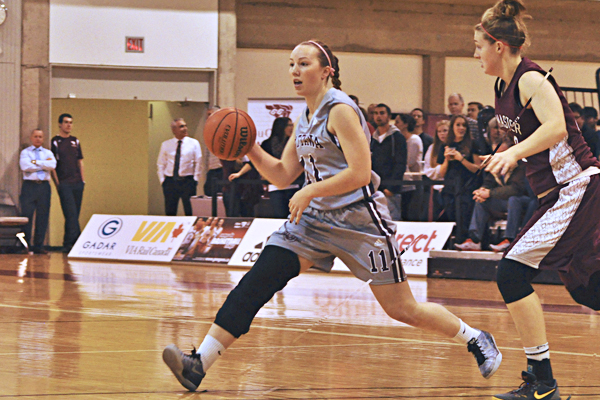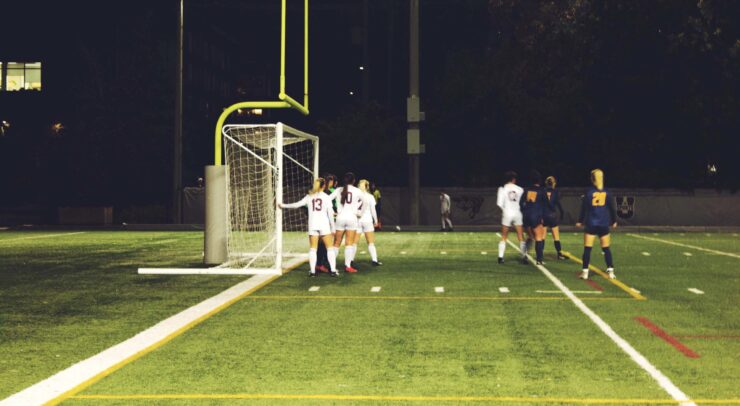Men’s rugby team tries once again to attain varsity status
Maclaine Chadwick | Fulcrum Staff
Photo by Maclaine Chadwick
They compete against other universities, they practice for hours every week, and they proudly sport garnet and grey on their jerseys. But the men’s rugby team—along with many other teams at the University of Ottawa—is a competitive club, which means they receive less financial support from the school.
They are also a team who are working hard to change that.
“I’ve been happy with what I have been able to achieve at the U of O,” said Owen McMorris, a fourth-year health sciences student and captain of the men’s rugby team. “But I want the new guys coming in to be able to get more from it than I did, and that means going varsity.”
It’s one of the most common sport-related questions at the U of O: Why are some teams varsity, and others only competitive clubs? What’s the difference?
Danika Smith, student-athlete services officer at the U of O, explained that although being a club team isn’t necessarily a stepping-stone to becoming a varsity team, the main difference is simply the level of funding provided to the team.
“There are lots of clubs who would like their sport to be varsity—men’s rugby is one of them, [along with] men’s soccer, rowing, and fencing, to name a few—those are all clubs that outperform the funding that we give them,” said Smith. “We give them the funding so that they can participate, and they take that funding and they actually create teams that are very successful. They go above and beyond, and that’s because of their volunteer coaches and all of the support that they have created around the team.”
Above and beyond certainly describes the effort that the men’s rugby team has put into their season. They organize their own games, promote themselves online and on campus, and hold fundraisers throughout their season to gain support for the team.
“We actually use a lot of varsity teams as examples to try and follow what they do extra-curricularly,” explained Jean-Louis Murphy, fourth-year student and social representative for the men’s rugby team. “We try to follow how they structure their programs; they are the benchmark in a way.”
That’s not to say they are mimicking other programs completely.
“We are not trying to compare ourselves to football [and] say we deserve to be varsity because they are,” said McMorris. “We are different sports, we understand the process, and we respect it and are trying to take the appropriate steps to become varsity.”
One step the team is taking is circulating a petition to gain recognition from the university. Their goal is to obtain 5,000 signatures by March 31—which is when the competitive clubs will be reevaluated. The petition, which was only started last week, has nearly 1,000 signatures already.
The petition alone, however, won’t be enough to give the team the varsity nod that they strive for.
“If that petition comes with a giant cheque, then we could try to make something work,” said Smith. “Realistically, funding-wise, we would have to eliminate [a team] to add one.”
The team is well aware of the obstacles that they will face along the way.
“Of course, there are the hoops that we need to jump through—the petition, and we need to make sure the university has the funds to support us,” said Colin McCann, a fourth-year economics student and second-year forward on the team. “But another thing we need to do in order to get varsity status is prove that we can play at the standards that make fans want to come and watch us.”
The team isn’t far from achieving those standards—they lost by only 11 points to their main competitors, one of the squads from Queen’s University on Oct. 13—and won one of two games this past weekend against their other top competition from Kingston, the Royal Military College Paladins. The Gee-Gees finished their season with a 5-4 record.
Unfortunately, the biggest hurdle is the issue of support from the school. Smith explained that it’s nothing personal—taking on an extra varsity team just isn’t in the works right now.
“I try to help the teams as much as I can in my position,” said Smith. “But watching how things work and how we try and squeeze every dollar to try and make it work for our teams, I know that the decision is not based on somebody deciding ‘no, we don’t want that team,’ it’s that we just can’t handle supporting more teams.”
Despite this, in true rugby fashion, the Gee-Gees are going to keep pushing to get the status they know they deserve.
“We want to go varsity because we believe that we can properly represent the students and faculty at the University of Ottawa,” explained McMorris. “I 100 per cent believe that this team can be and deserves to be a varsity team at the university.”





